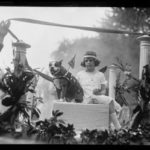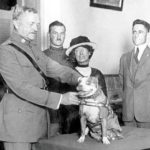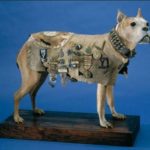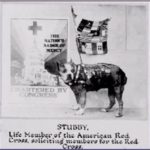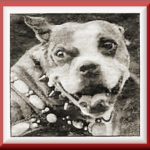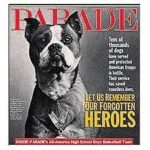SERGEANT STUBBY
AMERICA’S FIRST CANINE HERO,
AN AMERICAN PIT BULL TERRIER DOG,
WHO SERVED WITH THE 102ND INFANTRY AND WAS AWARDED
A VICTORY MEDAL AND A GOLD MEDAL FOR HIS VALOR
DURING WORLD WAR I
America’s first war dog, Stubby, served 18 months ‘over there’ and participated in seventeen battles on the Western Front. In February of 1918 he saved his regiment from surprise mustard gas attacks. He also located and comforted wounded, carried messages under fire and even once caught a German spy by the seat of his pants.
Back home his exploits were front page news of every major newspaper.
Stubby was an American Pit Bull Terrier – broadly speaking, very broadly! No one ever discovered where he hailed from originally. One day he just appeared when a bunch of soldiers were training at Yale Field in New Haven, Connecticut. He trotted in and out among the ranks as they drilled, stopping to make a friend here and
a friend there, until pretty soon he was on chummy terms with the whole bunch.
One soldier though, in particular, developed a fondness for the dog,
a Corporal Robert Conroy, who when it became time for the outfit to ship out,
hid Stubby on board the troop ship.
So stowaway Stubby sailed for France, after that Corporal Conroy became his accepted master, even though he was still on chummy terms with everyone else
in the outfit; and in the same spirit of camarderie that had marked
his initial overtures at Yale.
It was at Chemin des Dames that Stubby saw his first action, and it was there that the boys discovered he was a war dog par excellence. The boom of artillery fire didn’t faze him in the least, and he soon learned to follow the men’s example of ducking when the big ones started falling close. Naturally he didn’t know why he was ducking,
but it became a great game to see who could hit the dugout first. After a few days, Stubby won every time. He could hear the whine of shells long before the men.
It got so they’d watch him!
Then one night Stubby made doggy history. It was an unusally quiet night in the trenches. Some of the boys were catching cat naps in muddy dugouts, and Stubby was stretched out beside Conroy. Suddenly his big blunt head snapped up and his ears pricked alert. The movement woke Conroy, who looked at the dog sleepily just in time to see him sniff the air tentatively, utter a low growl, then spring to his feet,
and go bounding from the dugout, around a corner out of sight.
A few seconds later there was a sharp cry of pain and then the sound of a great scuffle outside. Conroy jumped from his bed, grabbed his rifle and went tearing out
towards the direction of the noise.
A ludicrous sight met his eyes. Single-pawed, in a vigorous offensive from the rear, Stubby had captured a German spy, who’d been prowling through the trenches.
The man was whirling desperately in an effort to shake off the snarling bundle of canine tooth and muscle that had attached itself to his differential.
But Stubby was there to stay.
It took only a few moments to capture the Hun and disarm him, but it required considerably more time to convince Stubby that his mission had been successfully carried out and that he should now release the beautiful hold he had on that nice,
soft German bottom.
By the end of the war, Stubby was known not only to every regiment, division, and army, but to the whole AEF. Honors by the bale were heaped on his muscled shoulders. At Mandres en Bassigny he was introduced to President Woodrow Wilson, who “shook hands” with him. Medal and emblemed jackets were bestowed upon him for each deed of valor, plus a wound stripe for his grenade splinter. Not to be left out, the Marines even made him an honorary sergeant.
After the Armistice was signed, Stubby returned home with Conroy and his popularity
seemed to grow even more. He became a nationally acclaimed hero, and eventually was received by presidents Harding and Coolidge. Even General John “Black Jack” Pershing, who commanded the American Expeditionary Forces during the war, presented Stubby with a Gold Medal made by the Humane Society
and declared him to be a “hero of the highest caliber”.
Stubby toured the country by invitation and probably led more parades than any other dog in American history; he was also promoted to honorary sergeant by the Legion,
becoming the highest ranking dog to ever serve in the Army.
He was even made an honorary member of the American Red Cross, the American Legion and the YMCA, which issued him a lifetime membership card
good for “three bones a day and a place to sleep.”
Stubby At Georgetown, Massachusetts!
Afterwards, Stubby became Georgetown University’s mascot. In 1921, Stubby’s owner, Robert Conroy was headed to Georgetown for law school and took the dog along. According to a 1983 account in Georgetown Magazine, Stubby “served several terms as mascot to the football team.” Between the halves, Stubby would nudge a football around the field, much to the delight of the crowd. Many friends thought Massachusetts or further northeast was Stubby’s birthplace.
Old age finally caught up with the small warrior on April 4th, 1926,
as he took ill and died in Conroy’s arms.
Stubby and a few of his friends were instrumental in inspiring the creation
of the United States ‘K-9 Corps’ just in time for World War II.
U.S. War Dogs Asso. – Revisions and Photos by The Dawnrest Family.
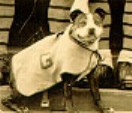
The Hero Dog!
Earned a record of documented heroism and American lives saved.
In no-man’s-land, “STUBBY”
was wounded by Shrapnel and recovered to join the 102nd in more battles at Chateau Thierry, the Marne and the Meuse-Argonne.
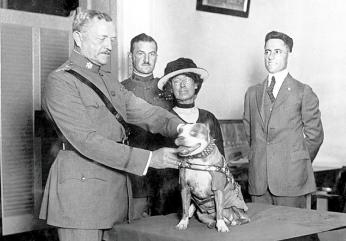
There have been many American Pit Bull Terrier Dogs used as mascots to represent the U.S.A..
Often they were depicted with U.S. flags and famous phrases such as
“SAFE UNDER THE RIGHT PROTECTION”.
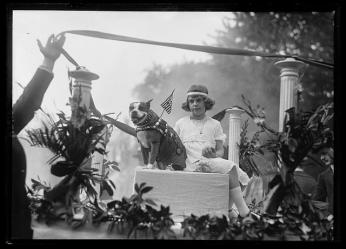
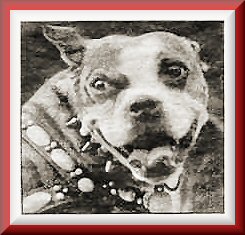
The Original War Dog, Mascot of World War 1
After 17 battles, “STUBBY” sailed back to America
a hero of the highest caliber
for bravery and courage far beyond recognition.
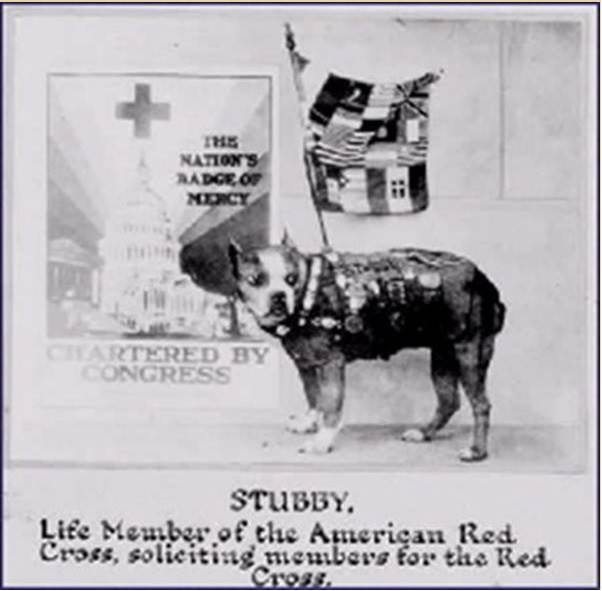
Life member of the American Red Cross
Shown here soliciting members for the Red Cross.
THE NATION’S BADGE OF MERCY
CHARTERED BY CONGRESS
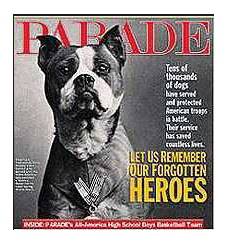
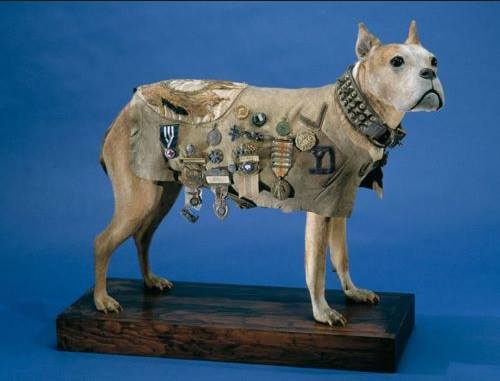
In 1926 when “STUBBY”, the war dog felled from old age, his body was preserved and displayed for 30 years at the Red Cross museum in Washington D.C. as part of the Smithsonian in the section showing uniforms of U.S.A.. French women made a blanket for the war hero to wear and more medals were pinned to “STUBBY’s” cloak. When his fur and skin deteriorated he was stored in a packing crate in a Smithsonian storeroom. Then the Smithsonian renovated the National Museum of American History which has a new armed forces history hall and “STUBBY” was sent packing to a National Guard armory in New England, back to his Connecticut home.
References:
- https://portal.ct.gov/MIL/MAPO/History/People/Stubby-the-Military-Dog
- https://www.dawnrestdogs.org/HEROES_SGTSTUBBY.html
